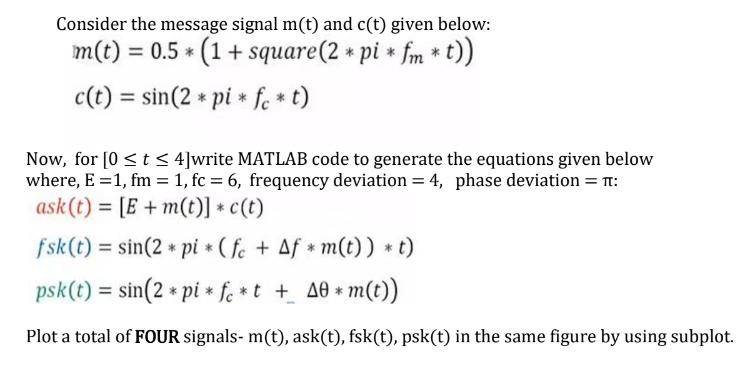Question
Consider the message signal m(t) and c(t) given below: m(t) = 0.5*(1 + square (2 * pi * fm * t)) c(t) = sin(2*

Consider the message signal m(t) and c(t) given below: m(t) = 0.5*(1 + square (2 * pi * fm * t)) c(t) = sin(2* pi* fe *t) Now, for [0 t 4]write MATLAB code to generate the equations given below where, E = 1, fm = 1, fc = 6, frequency deviation = 4, phase deviation = : ask (t) = [E+ m(t)] * c(t) fsk(t) = sin(2* pi* (fc + Af* m(t)) * t) psk (t) = sin(2* pifc*t + A0* m(t)) Plot a total of FOUR signals- m(t), ask(t), fsk(t), psk(t) in the same figure by using subplot.
Step by Step Solution
3.38 Rating (167 Votes )
There are 3 Steps involved in it
Step: 1

Get Instant Access to Expert-Tailored Solutions
See step-by-step solutions with expert insights and AI powered tools for academic success
Step: 2

Step: 3

Ace Your Homework with AI
Get the answers you need in no time with our AI-driven, step-by-step assistance
Get StartedRecommended Textbook for
Signals and Systems using MATLAB
Authors: Luis Chaparro
2nd edition
123948126, 978-0123948120
Students also viewed these Accounting questions
Question
Answered: 1 week ago
Question
Answered: 1 week ago
Question
Answered: 1 week ago
Question
Answered: 1 week ago
Question
Answered: 1 week ago
Question
Answered: 1 week ago
Question
Answered: 1 week ago
Question
Answered: 1 week ago
Question
Answered: 1 week ago
Question
Answered: 1 week ago
Question
Answered: 1 week ago
Question
Answered: 1 week ago
Question
Answered: 1 week ago
Question
Answered: 1 week ago
Question
Answered: 1 week ago
Question
Answered: 1 week ago
Question
Answered: 1 week ago
Question
Answered: 1 week ago
Question
Answered: 1 week ago
Question
Answered: 1 week ago
Question
Answered: 1 week ago
View Answer in SolutionInn App



